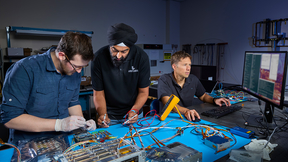Lab to provide optical payload for upcoming U.S. Space Force mission
 (Download Image)
(Download Image)
In June of 2021, an LLNL team provided a three-mirror reflective telescope and sensor in record time for the payload of a U.S. Space Force launch called the Tactically Responsive Launch-2 mission (shown above). The upcoming VICTUS HAZE mission will be LLNL’s second payload for tactically responsive space missions.
Lawrence Livermore National Laboratory’s (LLNL) Space Program is now building an optical space domain awareness payload for an upcoming mission by the U.S. Space Force.
The planned mission, known as VICTUS HAZE, will be a tactically responsive space mission to demonstrate the ability to rapidly characterize an on-orbit threat.
The U.S. Space Force selected Long Beach, California-based Rocket Lab to execute a responsive launch with a maneuverable satellite, and it also selected Colorado-based True Anomaly to build a second maneuverable satellite to enable the end-to-end demonstration.
The payload for VICTUS HAZE will use the LLNL monolithic telescope technology. LLNL’s monolithic telescopes are built out of a single piece of fused silica, eliminating the need for alignment and calibration after manufacture, while still providing the best possible resolution.
The robustness of the monolithic telescopes and their ability to work immediately after launch make them ideal for responsive space missions.
LLNL’s monolithic telescope was developed and patented by Lab employees Willem de Vries and Brian Bauman and former Lab employee Alex Pertica.
For VICTUS HAZE, the Space Safari Program Office of the U.S. Space Force’s Space System Command is partnering with the Defense Innovation Unit and SpaceWERX to advance commercial capabilities for tactically responsive space. Tactically responsive space focuses on all aspects of the national security imperative to deliver on-orbit capabilities to the joint force with speed and agility.
Established in January 2021, Space Safari is an acquisition program office responsible for responding to high-priority, urgent space needs by rapidly acquiring, integrating and executing missions supporting U.S. Space Command requirements and other combatant commander needs.
The contractors for VICTUS HAZE will have until fall of 2025 to build and test a launch vehicle, as well as two satellites and ground segments. LLNL will need to build, qualify and integrate its optical payload with the Rocket Lab vehicle in time for launch. Upon receiving a notice to launch, Rocket Lab will have just 24 hours to be ready to launch the satellite. The Space Force expects the satellites to be operational shortly after launch.
“We are grateful to LLNL for providing their advanced optical payload for this pivotal demonstration,” said Lt. Col. Jason Altenhofen, director of operations for Space Safari. “Agile integration and rapid on-orbit initialization of external payloads are key enablers to meet the VICTUS HAZE mission objectives.”
This will be LLNL’s second payload for tactically responsive space missions. The first was the Tactically Responsive Launch-2 mission, which successfully launched and operated on-orbit in 2021 and 2022.
“The Tactically Responsive Launch-2 project was a huge success for LLNL and our partners at Space Safari,” said John Ganino, the space hardware lead in the Lab’s Space Program.
“We proved that a motivated and agile interdisciplinary team can design, build and launch optical telescopes on tactically responsive timelines to support the warfighter’s need for new mission capabilities," said Ganino. "It is with this same spirit that we will integrate our payload on a commercial spacecraft to accelerate responsive space timelines on VICTUS HAZE.”
Contact
 Stephen Wampler
Stephen Wampler
[email protected]
(925) 423-3107
Related Links
LLNL’s Tactically Responsive Launch-2 payload launched into orbit,” July 2, 2021Space Science Institute
Tags
DefenseSpace security
Global Security
Space
Space Science Institute
Featured Articles







